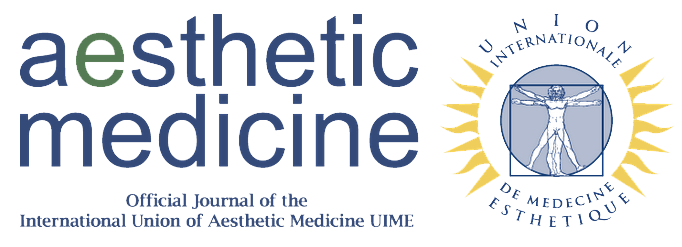Janus Kinase (JAK) Inhibitor Therapy: a new opportunity for patients with autoimmune disease
Keywords:
Alopecia, Janus Kinase (JAK) Inhibitor TherapyReferences
1. Lee HH, Gwillim E, Patel KR, et al. Epidemiology of alopecia areata, ophiasis, totalis, and universalis: A systematic review and meta-analysis. J Am Acad Dermatol. 2020; 82(3):675-682.
2. Mohan GC, Silverberg JI. Association of Vitiligo and Alopecia Areata With Atopic Dermatitis: A Systematic Review and Meta-analysis. JAMA Dermatol. 2015; 151(5):522-528.
3. Okhovat JP, Marks DH, Manatis-Lornell A, Hagigeorges D, Locascio JJ, Senna MM. Association between alopecia areata, anxiety, and depression: A systematic review and meta-analysis. J Am Acad Dermatol. 2023; 88(5):1040-1050.
4. Toussi A, Barton VR, Le ST, Agbai ON, Kiuru M. Psychosocial and psychiatric comorbidities and health-related quality of life in alopecia areata: A systematic review. J Am Acad Dermatol. 2021; 85(1):162-175.
5. Kuty-Pachecka M. Psychological and psychopathological factors in alopecia areata. Psychiatr Pol. 2015; 49(5):955-964.
6. Wikramanayake TC, Haberland NI, Akhundlu A, Laboy Nieves A, Miteva M. Prevention and Treatment of Chemotherapy-Induced Alopecia: What Is Available and What Is Coming?. Curr Oncol. 2023; 30(4):3609-3626.
7. Yan A, Drake L, Hadsall S, Gaurav A, Xia E, Mostaghimi A. Evaluating the sources and types of dietary and nutritional advice for patients with alopecia areata. Arch Dermatol Res. 2024; 316(6):283.
8. Sellami R, Masmoudi J, Ouali U, et al. The relationship between alopecia areata and alexithymia, anxiety and depression: a case-control study. Indian J Dermatol. 2014; 59(4):421.
9. Kim JS, Lee GJ, Jeong CY, et al. Risk of Alopecia Areata After COVID-19. JAMA Dermatol. 2024; 160(2):232-235.
10. Fagoni N, Bellini L, Bonora R, et al. Changing the stroke network during pandemic scenarios does not affect the management of patients with a positive Cincinnati prehospital stroke scale. Neurol Sci. 2024; 45(2):655-662.
11. Stirparo G, Pireddu R, Andreassi A, Sechi GM, Signorelli C. Social Illness Before and After the COVID-19 Pandemic: A Regional Study. Prehosp Disaster Med. 2023; 38(2):243-246.
12. Gambolò L, D'Angelo M, Stirparo G. Exploring serendipitous relief: SSRIs as a potential treatment for aphthosis - a case report. Aesthetic Medicine. 2023; 9(4):e2023019.
13. Stirparo G, Pireddu R, D'Angelo M, Bottignole D, Mazzoli R, Gambolò L. Is Mental Health Worse in Medical Students than in the General Population? A Cross-Sectional Study. Medicina (Kaunas). 2024; 60(6):863.
14. https://www.gazzettaufficiale.it/atto/serie_generale/caricaDettaglioAtto/originario?atto.dataPubblicazioneGazzetta=2024-09-17&atto.codiceRedazionale=24A04768&elenco30giorni=true [last access 06.10.2024]
15. Rudnicka L, Arenbergerova M, Grimalt R, et al. European expert consensus statement on the systemic treatment of alopecia areata. J Eur Acad Dermatol Venereol. 2024; 38(4):687-694.
16. Eisman S, Sinclair R. Ritlecitinib: an investigational drug for the treatment of moderate to severe alopecia areata. Expert Opin Investig Drugs. 2021; 30(12):1169-1174.
17. King B, Ohyama M, Kwon O, et al. Two Phase 3 Trials of Baricitinib for Alopecia Areata. N Engl J Med. 2022; 386(18):1687-1699.
19. Amore AL, Bartoletti E, Gennai A. Regenerative medicine and carboxytherapy: a promising combination for androgenetic alopecia. Aesthetic Medicine. 2024]; 10(2):e2024011.
20. Bartoletti E, Lacasella GV, Karaboue K, Cavalieri L. Aesthetic Medicine: towards defining its own clinical role and necessary discipline. Aesthetic Medicine. 2024 ;10(1):e2024008.
Downloads
Published
Issue
Section
License
Copyright (c) 2025 Daniele Solla, Luca Gambolò, Marta D'Angelo

This work is licensed under a Creative Commons Attribution-NonCommercial 4.0 International License.
This is an Open Access article distributed under the terms of the Creative Commons Attribution License (https://creativecommons.org/licenses/by-nc/4.0) which permits unrestricted use, distribution, and reproduction in any medium, provided the original work is properly cited.
Transfer of Copyright and Permission to Reproduce Parts of Published Papers.
Authors retain the copyright for their published work. No formal permission will be required to reproduce parts (tables or illustrations) of published papers, provided the source is quoted appropriately and reproduction has no commercial intent. Reproductions with commercial intent will require written permission and payment of royalties.

This work is licensed under a Creative Commons Attribution-NonCommercial 4.0 International License.





